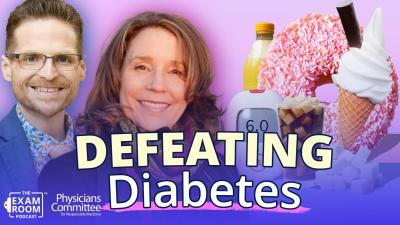Does Sugar Cause Diabetes?
The recent film What the Health raised the question as to whether sugar or other carbohydrates cause diabetes. Because blood sugar levels are high in diabetes, a common notion has held that eating sugar somehow triggers the disease process.
The recent film What the Health raised the question as to whether sugar or other carbohydrates cause diabetes.
The notion is understandable. Blood sugar levels are high in diabetes, so a common idea has held that eating sugar somehow triggers the disease process. However, the major diabetes organizations take a different view. The American Diabetes Association1 and Diabetes UK2 have labelled this notion a “myth,” as has the Joslin Diabetes Center,3 which wrote, “Diabetes is not caused by eating too much sugar.” These and other organizations have worked to educate people about the causes of diabetes and the role that foods play in the disease process.
Type 1 diabetes is an autoimmune disease. Type 2 diabetes—the most common form of the disease—is caused by insulin resistance and pancreatic failure. Here is what you need to know:
Sugar Is the Body’s Fuel
The human body runs on glucose, a simple sugar. Just as gasoline powers your car, glucose powers your muscles, your brain, and the rest of your body. Glucose comes from fruit and from starchy foods, such as grains, beans, and potatoes, and your body can also produce it when needed. Without it you would die.
Diabetes means having higher-than-normal blood glucose values. It comes in three common forms:
- Type 1 diabetes is caused by the destruction of the insulin-producing cells of the pancreas, usually through an autoimmune process. The triggers for this process are under investigation and may include dairy proteins, viruses, or other factors.
- Type 2 diabetes typically starts with insulin resistance. That is, the cells of the body resist insulin’s efforts to escort glucose into the cells. What causes insulin resistance? It appears to be caused by an accumulation of microscopic fat particles within muscle and liver cells.4 This fat comes mainly from the diet—chicken fat, beef fat, cheese fat, fish fat, and even vegetable fat. To try to overcome insulin resistance, the pancreas produces extra insulin. When the pancreas can no longer keep up, blood sugar rises. The combination of insulin resistance and pancreatic cell failure leads to type 2 diabetes.
- Gestational diabetes is similar to type 2 and occurs during pregnancy.
What Fuels the Diabetes Epidemic?
In Japan, China, and other Asian countries, the transition from traditional carbohydrate-rich (e.g., rice-based) diets to lower-carbohydrate Westernized eating habits emphasizing meats, dairy products, and fried foods has been accompanied by a major increase in diabetes prevalence. Similarly, in the United States, a meat-based (omnivorous) diet is associated with a high prevalence of diabetes, compared with dietary patterns emphasizing plant-derived foods. In the Adventist Health Study-2, after adjusting for differences in body weight, physical activity, and other factors, an omnivorous diet was associated with roughly double the risk of diabetes, compared with a diet omitting animal products.5
In clinical trials, when people change from an omnivorous diet to a low-fat vegan diet, diabetes typically improves significantly.6
These findings from observational studies and clinical trials resonate with the finding from magnetic resonance spectroscopy showing that fat inside the cells leads to insulin resistance, the first step toward type 2 diabetes.
Sugar Is Falling, Diabetes Is Rising
It has become fashionable in recent years to blame sugar for many health problems. However, per capita sugar consumption has actually been falling in the United States since 1999, when bottled water and sugar-free beverages began to edge sodas off the shelf. At the same time, consumption of cheese and oily foods has steadily increased, as has diabetes prevalence. This suggests that something other than sugar is driving the diabetes epidemic.
A number of studies have looked for relationships between sugar and diabetes risk. A 2017 meta-analysis, based on nine reports of 15 cohort studies including 251,261 participants, found no significant effect of total sugars on the risk of developing type 2 diabetes.7 Those consuming the most sugar actually had a 9 percent lower risk of developing diabetes, compared with those consuming the least sugar, although the difference was not statistically significant (meaning that it could have been a chance result). Similarly, fructose was not significantly associated with diabetes risk. Sucrose appeared to have a significant protective association. Those consuming the most sucrose had 11 percent less risk of developing type 2 diabetes, compared with those consuming the least.
Other studies have focused, not on sugar overall but specifically on sodas and other sugar-sweetened beverages. Many have found no significant relationship, apart from sugar’s extra calories that lead to weight gain. For example, the Women’s Health Study,8 the Atherosclerosis Risk in Communities Study,9 the Black Women’s Health Study,10 and the Multi-Ethnic Study of Atherosclerosis found no significant associations between sugar consumption and diabetes risk after adjustment for measures of body weight. Some studies have had mixed results, exonerating sucrose, but indicting glucose and fructose.12,13 And some studies have shown associations between sugar-sweetened beverages and diabetes that persist after adjustment for body weight.14,15
A 2015 meta-analysis summarizing the results of 17 cohorts concluded that, after adjustment for body weight, a daily 250 mL serving of sugar-sweetened beverages was associated with approximately 13 percent higher risk of developing diabetes.
If sugars in general are not associated with increased diabetes risk, but sodas are, it suggests the possibility that something other than sugar explains this relationship.16 Sodas are often accompanied by cheeseburgers, chicken nuggets, and other unhealthful foods. That is, soda consumption can be a sign of a diet focusing on fast foods or an overall unhealthful diet and lifestyle. And sugary snack foods (e.g., cookies and snack pastries) are often high in fat; the sugar lures us in to the fat calories hiding inside. Some, but not all, observational trials have sought to control for these confounding variables.
Still, Sugar Is Not a Health Food
So our bodies actually run on sugar—that is, glucose. Moreover, sugar has only 4 calories per gram (much less than fats and oils, which have 9 calories per gram), and sugar’s calories can be used for metabolic needs or stored as glycogen. So does that mean that added sugars are innocuous?
Certainly not. Although glucose is an important fuel for the body, there is no physiological need for added sugars. Because sugar dissolves into sodas and snack foods, it is easy to consume surprisingly large quantities of it, potentially contributing to weight gain. In turn, higher body weight can make type 2 diabetes more likely to occur.
Conclusion
Diabetes is a serious disease. Its most common form, type 2 diabetes, has become a worldwide epidemic as Western eating habits spread. An understanding of its causes is essential to identifying means of combatting it.
The roots of type 2 diabetes remain in insulin resistance and pancreatic failure, and the blame for the current diabetes epidemic lies in an overall dietary pattern emphasizing meat, dairy products, and fatty foods, aided and abetted by sugary foods and beverages, rather than simply in sugar alone. A diet emphasizing vegetables, fruits, whole grains, and legumes and avoiding animal products helps prevent diabetes and improves its management when it has been diagnosed.
The idea that “eating sugar causes diabetes” is inaccurate. Nonetheless, avoiding added sugars is a helpful step, and it should be taken in addition to a healthful plant-based eating pattern, not instead of it.
References
- American Diabetes Association. Diabetes Myths. http://www.diabetes.org/diabetes-basics/myths/. Accessed August 6, 2017.
- Diabetes UK. Myth: Sugar Causes Diabetes. https://www.diabetes.org.uk/Guide-to-diabetes/Enjoy-food/Eating-with-diabetes/Diabetes-food-myths/Myth-sugar-causes-diabetes/. Accessed August 6, 2017. 
- Joslin Diabetes Center. Four Myths about Diabetes. http://www.joslin.org/info/4_Myths_About_Diabetes.html. Accessed August 6, 2017.
- Petersen KF, Dufour S, Befroy D, Garcia R, Shulman GI. Impaired mitochondrial activity in the insulin-resistant offspring of patients with type 2 diabetes. N Engl J Med. 2004;350:664–671. 
- Tonstad S, Butler T, Yan R, Fraser GE. Type of vegetarian diet, body weight and prevalence of type 2 diabetes. Diabetes Care. 2009;32:791-796.
- Yokoyama Y, Barnard ND, Levin SM, Watanabe M. Vegetarian diets and glycemic control in diabetes: a systematic review and meta-analysis. Cardiovasc Diagn Ther. 2014;4:373-382. 
- Tsilas CS, de Souza RJ, Blanco Mejia S, et al. Relation of total sugars, fructose and sucrose with incident type 2 diabetes: a systematic review and meta-analysis of prospective cohort studies. CMAJ. 2017;189:E711-720.
- Janket SJ, Manson JE, Sesso H, Buring JE, Liu S. A prospective study of sugar intake and risk of type 2 diabetes in women. Diabetes Care. 2003;26:1008-1015.
- Paynter NP, Yeh HC, Voutilainen S, et al. Coffee and sweetened beverage consumption and the risk of type 2 diabetes mellitus: the atherosclerosis risk in communities study. Am J Epidemiol. 2006;164:1075-1084.
- Palmer JR, Boggs DA, Krishnan S, Hu FB, Singer M, Rosenberg L. Sugar-sweetened beverages and incidence of type 2 diabetes mellitus in African American women. Arch Int Med. 2008;168:1487-1492.
- Nettleton JA, Lutsey PL, Wang Y, Lima JA, Michos ED, Jacobs DR Jr. Diet soda intake and risk of incident metabolic syndrome and type 2 diabetes in the Multi-Ethnic Study of Atherosclerosis (MESA). Diabetes Care. 2009;32:688-694.
- Meyer KA, Kushi LH, Jacobs DR Jr, Slavin J, Sellers TA, Folsom AR. Carbohydrates, dietary fiber, and incident type 2 diabetes in older women. Am J Clin Nutr. 2000;71:921-930. 
- Montonen J, Jarvinen R, Knekt P, Heliovaara M, Reunanen A. Consumption of sweetened beverages and intakes of fructose and glucose predict type 2 diabetes occurrence. J Nutr. 2007 137:1447-1454.
- Bazzano LA, Li TY, Joshipura KJ, Hu FB. Intake of fruit, vegetables, and fruit juices and risk of diabetes in women. Diabetes Care. 2008;31:1311-1317.
- Schulze MB, Manson JE, Ludwig DS, et al. Sugar-sweetened beverages, weight gain, and incidence of type 2 diabetes in young and middle-aged women. JAMA. 2004;292:927-934.
- Imamura F, O’Connor L, Ye Z, et al. Consumption of sugar sweetened beverages, artificially sweetened beverages, and fruit juice and incidence of type 2 diabetes: systematic review, meta-analysis, and estimation of population attributable fraction. BMJ. 2015;351:h3576.








